- Home
- Cheryl Bolen
My Lord Wicked (Historical Regency Romance)
My Lord Wicked (Historical Regency Romance) Read online
Praise for Cheryl Bolen's novels:
Cheryl Bolen's books are going to be keepers. – Christina Dodd, NY Times Bestseller
Once again the author has proven herself to be one of the best authors in the Regency romance field today. – Huntress Reviews
. . .a rising star in the historical/regency romance genre. – A Romance Review
Bolen. . .does a wonderful job of building simmering sexual tension. – Booklist
***
My Lord Wicked...
What woman would dare make her home at eerie Marshbanks Abbey, perched on a stony hill in remote Northumbria? It is said its owner, the brilliant botanist, Lord Stacks, killed his beautiful bride there ten years earlier.
Unaware of the tales of Lord Stacks' wickedness, Freddie Lambeth comes to live with her guardian, and through his caring blossoms from a plain, shabbily dressed girl to a lovely young woman. Freddie and Lord Stacks come to need each other as his flowers need sunshine, but Stacks cannot allow himself to love her. His own wickedness has destroyed any chance for happiness.
eBooks available from award-winning author Cheryl Bolen
Regency Historical Romance:
The Brides of Bath Series
The Bride Wore Blue*
With His Ring*
The Bride’s Secret (previously titled A Fallen Woman*
To Take This Lord (previously titled An Improper Proposal)*
The Regent Mysteries Series
With His Lady's Assistance
A Most Discreet Inquiry
A Lady by Chance*
The Earl's Bargain
My Lord Wicked
His Lordship's Vow
Lady Sophia's Rescue
Christmas Brides (Three Regency Novellas)
Marriage of Inconvenience*
A Duke Deceived*
One Golden Ring*
Romantic Suspense:
Texas Heroines in Peril Series
Protecting Britannia
Murder at Veranda House
A Cry In The Night
Capitol Offense
Falling For Frederick
World War II Romance:
It Had to Be You (Previously titled Nisei)
American Historical Romance:
A Summer To Remember (3 American Romances)
* Previously published in paperback
My Lord
Wicked
Cheryl Bolen
Copyright © 2011 by Cheryl Bolen
My Lord Wicked is a work of fiction. Names, characters, places, and incidents are the products of the author’s imagination or are used fictitiously. Any resemblance to actual events, locales, or persons, living or dead, is entirely coincidental.
All rights reserved.
No part of this publication may be reproduced, stored or transmitted in any form or by any means without the prior written permission of the author.
Table of Contents
Chapter 1
Chapter 2
Chapter 3
Chapter 4
Chapter 5
Chapter 6
Chapter 7
Chapter 8
Chapter 9
Chapter 10
Chapter 11
Chapter 12
Chapter 14
Chapter 15
Chapter 16
Chapter 17
Chapter 18
Chapter 19
Chapter 20
Chapter 21
Chapter 22
Chapter 23
Chapter 24
Chapter 25
Chapter 26
Chapter 27
Chapter 28
Chapter 29
Chapter 30
Chapter 31
Other eBooks by Cheryl
Chapter 1
Miss Freddie Lambeth barged into her aunt’s drawing room and launched into a rant. "Had I no home but a hollowed-out tree, no food but swine’s intestines, no shoes to trudge through knee-high snow and clothes thin enough to read through, I still would NOT be desperate enough to marry Mr. Hastings!" Her voice — like every inch of her — quivered with rage.
Aunt Dorothea’s open mouth froze. Her narrowed eyes froze. Her hand clutching the teapot froze. Finally, she gathered her composure and spoke to the vicar and his wife, who sat opposite her. "It appears my ill-mannered niece was eavesdropping."
Freddie had not intended to eavesdrop. Not until her name was linked to the lecherous Mr. Hastings, a most disagreeable man born some fifty years before her. "It is my intention," Aunt Dorothea had said, "that Frederica marry Mr. Hastings."
Had her aunt sold her into slavery with a shipload of Hottentots, Freddie could not have been more outraged. Everything about the odious Mr. Hastings repelled her, from the shiny top of his bald head to his rotting teeth to his corpulent body — a body he most decidedly had tried to press against hers when she’d brought him a special elixir for his gout.
Freddie’s shallow breath coming in quick gasps, tears gathering in her eyes, she spun away and stormed from the drawing room. Why waste her breath trying to justify the eavesdropping to her unreasonable aunt?
She strode across the broad, checkered marble entry hall, still reeling over Aunt Dorothea’s disclosure. Freddie would rather follow her recently departed father to the grave than marry Mr. Hastings.
She kicked one of the legs of Aunt Dorothea’s new Sheraton sideboard and mumbled under her breath.
Here at Chilton Manor she was as unwanted as the pox. If only she were Catholic. She could enter a convent. But what was she to do?
Her father had never seen fit to have her instructed in the feminine arts. She could not play the pianoforte. She could not render elegant watercolors. She could not speak a single word of French. And her skill at needlework was nonexistent. Being a governess was, lamentably, out of the question.
Perhaps she could tutor young gentlemen. She could read Latin and Greek fluently and was uncommonly good at mathematics. But who would hire a girl not quite eighteen to tutor boys nearly her own age?
Tears clouding her vision, she stumbled to the newel post, grabbed it to steady herself, then began to mount the staircase, anger pouring deep inside her like bubbling, molten lava. As had so often been the case these three months past, her initial fury was directed at her aunt, but Freddie herself bore the brunt of the second wave of anger. Why had she raced into her aunt’s drawing room like a deranged banshee? When would she ever learn that an unattractive, penniless orphan devoid of feminine accomplishments must suppress her own opinions, must be subservient to those whose charity she was forced to accept?
Freddie the Proud. She had the devil of a time casting off her indomitable pride. Even when she came abreast of her cousin Roxanne.
"I beg that you take off that pathetic dress before any of my friends see you, Frederica." Roxanne came to an abrupt halt and glared down at Freddie. "I shall have my maid bring you my castoffs. Anything would be preferable to that ghastly faded muslin you wear every single day."
Freddie’s spine straightened, and she lifted her defiant chin. "Don't bother." Even though Roxanne's hand-me-downs would likely have been the finest garments ever to grace Freddie's gawky body, she was far too proud to accept them. "I shan't embarrass you. I plan to stay in my chamber the remainder of the afternoon."
The fair Roxanne gazed down her aquiline nose at her cousin. "What ever can you find to do in your chamber all afternoon?"
"I have my books, and I shall write to my guardian, Lord Stacks." There went her blasted pride again, flaunting the baron's title! One bound to live off others' charity would do well to learn humility.
Roxanne's p
erfectly shaped flaxen brows rose. "I would have thought your father's solicitor the one to communicate with your guardian."
Her cousin had the right of it. Previously Freddie had written to Lord Stacks only to thank him for the birthday gifts he sent her each year.
She sailed past her petite cousin, past the brightly lit, opulent second floor with its baroque chandeliers and gleaming wainscoting and plush Persian carpets, then trod up a narrower wooden staircase to the dark and dreary third floor and the welcome sanctuary of her tiny room in the damp servants' wing.
In most respects, Freddie’s narrow bedchamber was indistinguishable from the other third-floor rooms with their skinny, austere beds on cold stone floors, their tiny bedside tables splotched with spilled candle wax, their lone dormer windows that let in small squares of gray sky.
Only Freddie’s room held treasures far beyond the grasp of the servants who occupied the third floor. For Miss Freddie Lambeth’s room stored an impressive library of fine, leather-bound books. All of them — save her mother’s Bible which held the place of honor on her bedside table — were birthday gifts from Lord Stacks, the guardian she had never met.
From end to end, the books filled the top of the simple scrubbed wood table that served as her writing desk. She pulled a rickety chair up to the table, sat down, and gathered her black knit shawl tightly about her to abate the room’s persistent chill. Her gaze scanned the fine gilt-tooled volumes, but her mind would not settle on any of them. Not when her situation at Chilton Manor was more untenable than ever now that she had been so disrespectful to Aunt Dorothea.
Were she not such a coward, she would run away, but how did one run away without two shillings to rub together?
It did seem as if marriage was the only way out of Chilton Manor and away from her unpleasant aunt and taunting cousins. A pity her only prospect was seventy-year-old Mr. Hastings.
She rather thought plighting her life to someone whom she could care about, someone who could give her children, would be the greatest joy on earth. But marriages to eligible young men were not an option for plain girls without dowries.
More’s the pity.
No matter how much she desired matrimony, she knew she inhabited a netherworld where marriage was not obtainable. Her matrimonial prospects would have been higher were her birth lower. As a baronet’s granddaughter, she was too well born, too well educated, and, unfortunately, too discerning to find contentment with the kind of simple-minded man who married a simple-minded woman with no dowry.
When she had come to Chilton Manor she had hoped her uncle, Sir Harold, would see that she moved in the kind of society where she might have had the opportunity to meet younger sons of country squires or village solicitors — young men whose expectations were not high. But her uncle must have been too embarrassed over her appearance and lack of accomplishments to aid in her matrimonial quest.
Now, it would never happen. Freddie would never find a life’s mate.
But must it be so? Hope leaping to her breast, she suddenly realized she was not bound to stay here, after all. Her pulse accelerated with excitement. Perhaps she could persuade her guardian to invite her to Marshbanks Abbey. Lord Stacks was a very wealthy man who had no children of his own. Could he be her savior from Chilton Manor? Perhaps he could even be persuaded to present his ward. It need not be in the cream of London society. Especially since she would never belong in such society. She wished only to meet an intelligent gentleman of modest means.
She would swallow her blasted pride and appeal to Lord Stacks. Hopefully, he would take pity on her and ask her to Marshbanks Abbey. She could easily tolerate life in remote North Yorkshire with a brooding man. After all, she had spent her entire life cloistered with a brooding father who held her responsible for her mother's death in childbed.
She picked up her pen and began to write.
***
Thomas Winthrop, who had inherited the title Baron Stacks just after his twenty-first birthday, sat on a tufted seat in his carpeted dressing room while Roberts removed his muddied boots.
"Has your lordship considered erecting an orangery for your botanical studies?" the valet asked.
The baron drew an impatient breath but refrained from rebuking Roberts, having long ago realized it was his unfortunate lot to be saddled with a highly opinionated valet. When Roberts prefaced a statement with, "Has your lordship considered," he actually meant, "your lordship should."
Stacks contemplated his response while studying the gaunt valet who stooped to slide on his master's Hessians. A protruding chin was the most distinguishing feature on Roberts' gaunt face. Funny, Stacks thought, that Roberts' chin should stick out while his frail chest sank in. "I much prefer the outdoors, even if my boots do get sullied." After putting on boots that Roberts had spent the better part of the morning polishing, Stacks got to his feet.
"Is your lordship contemplating a visit to London to patronize your tailor?"
Stacks' brows drew together, and he cast a scornful glance at his valet. "All I could wish for is here at Marshbanks Abbey." He would not admit his reluctance to face the London gossips, the mothers who quickly removed their daughters from his presence. "It is said Lord Stacks killed his lovely wife," they would say. And though similar remarks were undoubtedly uttered in his home county, his reclusiveness shielded him from them. During the past decade he had grown content with the quiet life here in the north.
And contentment was the most a man like him could ever hope to obtain.
Roberts, who only vaguely concealed his preference for London, straightened his back. His face — like his tone — was without expression. "Very good, my lord."
"By the way, is this not the day when young Mr. Lambeth arrives?"
"Indeed it is, my lord. Your ward arrives by the post chaise this afternoon."
Stacks nodded. "I have instructed Mrs. Greenwood to ready the red room for him."
"Has your lordship remembered to procure a birthday gift for the lad?"
Stacks hissed an oath. "I completely forgot. How old will he be?"
"He turned eighteen yesterday, my lord."
What would a fellow of eighteen value, Stacks wondered as he paced to the arched, gothic window, his face clinched in thought. As he looked out over the thicket, an answer came to him. "I shall present the boy with the musket I received on my eighteenth birthday. If he's anything like his father, he's an uncommonly good sportsman. I'm rather looking forward to having the young fellow around." Walking away, he spoke in a barely audible voice thick with emotion. "God knows I shall never have a son of my own."
The letter from young Freddie made Stacks remember the lad’s father. They had met at Oxford, but their real closeness came after they left university, after their disastrous marriages. Stacks had never met the young woman for whom Frederick had cut short his studies to marry. Nor had Frederick met the beautiful Elizabeth, who became Lady Stacks a few years later. Yet it was these brides — or more precisely, their early deaths — that united in grief the two widowers. Through letters, they had laid bare their anguished souls. Frederick vowed never to marry again after losing his cherished Rosemary to childbed fever. Stacks, too, knew he would never marry after Elizabeth. Her needless, violent death still had the power to coil his hands into angry fists, still sent waves of nausea rushing over him, still tormented though ten years had since passed.
***
The third day into her journey north Freddie rested her weary head against the coach's grimy interior wall and finally admitted that she was wretchedly uncomfortable. She was especially angry at herself for purposely leaving behind her faded black shawl simply because she deemed it too shabby to wear in front of her guardian. That blasted pride of hers cost dearly as chilling March winds assaulted the coach.
Before she'd left Chilton Manor Freddie had repeatedly defended the traveling accommodations Aunt Dorothea smugly criticized. "Some peer of the realm his fancy lordship is," Aunt Dorothea had complained, "not even sending h
is own carriage for his ward, making her ride in a vulgar post chaise. And letting a young lady of quality travel without a maid! Why, it's the outside of propriety!"
It was all Freddie could do not to protest that she had no maid, had never had a maid, and was unlikely to ever have one.
Even while Sir Harold's family gathered to bid Freddie farewell as the Lambeth coach rattled up to take her to the nearest posting inn, Aunt Dorothea droned on. "I suppose it's just as well you will not be going in the grand Lord Stacks' undoubtedly luxurious coach, what with the way you look and dress."
At the parting there had been no hugs. No tears. No feigned affection.
To spite her aunt, Freddie had determined to enjoy the ride in the "vulgar" post chaise. Having never before been farther north than Tunbridge Wells, she pressed her face to the window and delighted in the varying scenery that flashed before her. Spring showers marred just one day, and the blossoming flowers along the way, especially the buttery yellow daffodils poking through new green grass, gave pleasure at every bend of the road. The new sights and sounds and smells kept Freddie's head spinning for days. She had marveled at sooty London with its hundreds of conveyances and thousands of people and splendid sailing vessels powering along the River Thames. North of the capital she eagerly watched as soft hills leveled out to rolling pastures.
But her delight over all the new experiences could not dispel the discomforts of her lengthy, tedious journey. Of being crushed against her fellow passengers — all of them male — as if they were kittens huddled together for warmth. Of her body begging to be stretched, walked, scratched, cleaned. Of spending nights in drafty posting inns that smelled of mildew, of sleeping on linens of dubious laundering.
As the journey wore on she had grown acutely aware of her gnawing loneliness. Each churn of the wheels seemed to say alone, alone, alone. The loneliness ingrained into her since birth had intensified since Papa’s death. With his death, she lost, too, the villagers whom her father had attended. Would the new surgeon provide as good of care? It was not likely he would have a daughter as skilled an assistant as Freddie had been. Who would tend her herbs and make the poultices and elixirs that sped her father's patients to recovery?

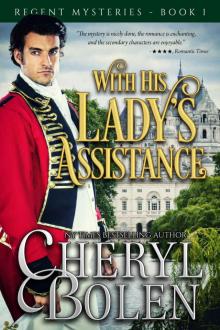 With His Lady's Assistance (The Regent Mysteries Book 1)
With His Lady's Assistance (The Regent Mysteries Book 1)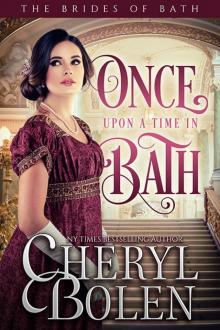 Once Upon a Time in Bath
Once Upon a Time in Bath One Room at the Inn (The Lords of Eton Book 4)
One Room at the Inn (The Lords of Eton Book 4) His Lady Deceived
His Lady Deceived Last Duke Standing
Last Duke Standing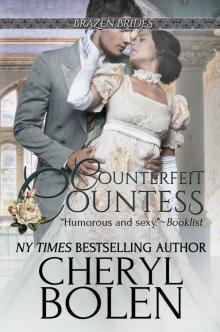 Counterfeit Countess: Brazen Brides, Book 1
Counterfeit Countess: Brazen Brides, Book 1 A Duke Deceived (The Deceived Series Book 1)
A Duke Deceived (The Deceived Series Book 1) An Egyptian Affair (The Regent Mysteries Book 4)
An Egyptian Affair (The Regent Mysteries Book 4) Winter Wishes: A Regency Christmas Anthology
Winter Wishes: A Regency Christmas Anthology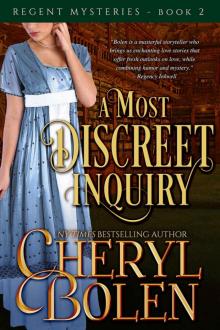 A Most Discreet Inquiry (The Regent Mysteries Book 2)
A Most Discreet Inquiry (The Regent Mysteries Book 2) The Portrait of Lady Wycliff
The Portrait of Lady Wycliff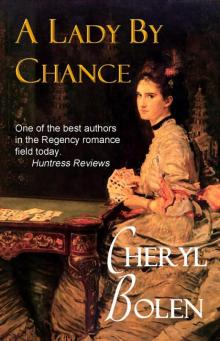 A Lady by Chance (Historical Regency Romance)
A Lady by Chance (Historical Regency Romance) His Lordship's Vow (Regency Romance Short Novel)
His Lordship's Vow (Regency Romance Short Novel) Lady Sophia's Rescue (Traditional Regency Romance)
Lady Sophia's Rescue (Traditional Regency Romance) A Birmingham Family Christmas
A Birmingham Family Christmas Oh What A (Wedding) Night (Brazen Brides #3)
Oh What A (Wedding) Night (Brazen Brides #3) A Christmas In Bath
A Christmas In Bath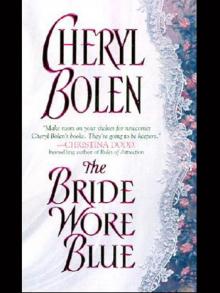 THE BRIDE WORE BLUE
THE BRIDE WORE BLUE Miss Hastings' Excellent London Adventure (Brazen Brides Book 4)
Miss Hastings' Excellent London Adventure (Brazen Brides Book 4)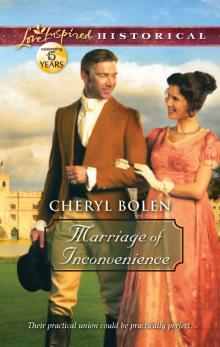 Marriage of Inconvenience
Marriage of Inconvenience Ex-Spinster by Christmas: House of Haverstock, Book 4
Ex-Spinster by Christmas: House of Haverstock, Book 4 With His Ring (Brides of Bath Book 2)
With His Ring (Brides of Bath Book 2)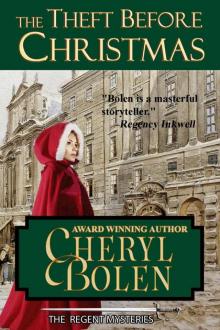 The Theft Before Christmas (The Regent Mysteries)
The Theft Before Christmas (The Regent Mysteries)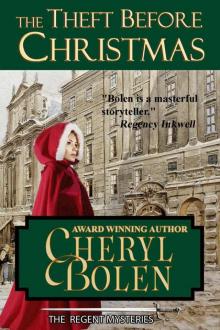 The Theft Before Christmas
The Theft Before Christmas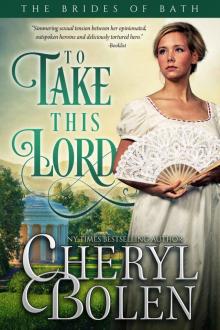 To Take This Lord (The Brides of Bath Book 4)
To Take This Lord (The Brides of Bath Book 4)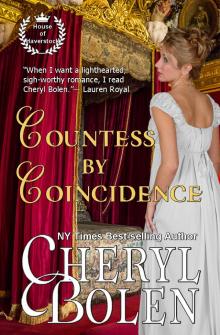 Countess by Coincidence
Countess by Coincidence Captivated by His Kiss: A Limited Edition Boxed Set of Seven Regency Romances
Captivated by His Kiss: A Limited Edition Boxed Set of Seven Regency Romances A Birmingham Family Christmas (Brazen Brides Book 5)
A Birmingham Family Christmas (Brazen Brides Book 5)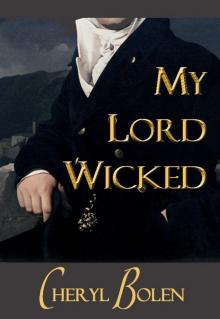 My Lord Wicked (Historical Regency Romance)
My Lord Wicked (Historical Regency Romance) A Duke Deceived
A Duke Deceived The Earl, the Vow, and the Plain Jane
The Earl, the Vow, and the Plain Jane The Bride's Secret
The Bride's Secret The Earl's Bargain (Historical Regency Romance)
The Earl's Bargain (Historical Regency Romance) Rebels, Rakes & Rogues
Rebels, Rakes & Rogues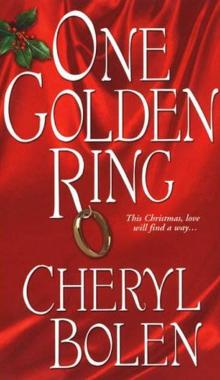 One Golden Ring
One Golden Ring